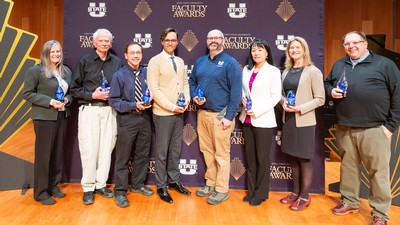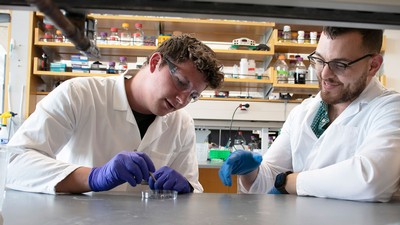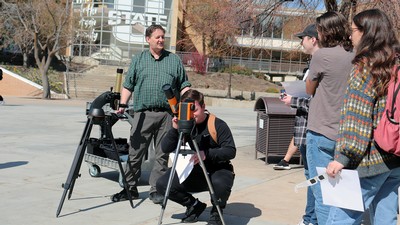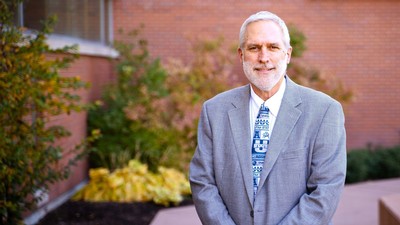Grant Galvanizes Plan to Create Community-Wide Response to Sexual Assault
Jennifer Roark, a criminologist and assistant professor of social work.
Months before sexual assaults on campus became newspaper headlines, two women — one a Utah State University social scientist and the other an advocate and therapist — began seeking funds to create a safety net for victims.
More sources of help exist for victims of sexual assault than ever before. Still, women — the crime’s most common target — often face the day after with painful, confused questions.
Should they report the violation to Title XI for investigation, or tell campus and other law enforcement? Should they even disclose their story at all? How do they find real help?
That’s the focus of a three-year $300,000 grant received by Jennifer Roark, a criminologist and assistant professor of social work, and Jenny Erazo, coordinator of USU’s Sexual Assault and Anti-violence Information (SAAVI). The grant writing was completed in summer 2015, and the grant announced in early October 2016.
The funds from the U.S. Department of Justice will support the creation of what Roark and Erazo describe as a coordinated community response involving USU, Cache County law enforcement and area women’s resources. The community angle is vital, Roark said, because while these victims may be students, “they’re also a part of our valley community.”
Whether victims seek help on or off campus, “we want to wrap victims in services so they can successfully complete their trajectory and not drop out of school,” Roark said. “At the same time, we’ll work with law enforcement and DAs to hold offenders accountable.”
“It’s huge,” said Erazo of the grant and the doors that just swung opened to her small office just north of Maverick Stadium. Erazo is the only full-time staff at SAAVI, which is designed to provide confidential help and counseling. SAAVI extends assistance, she said, to “anyone at USU who is a survivor or has questions about sexual assault, rape, dating violence, domestic violence, harassment, stalking, hate crimes, hazing” and more.
“This will allow us to have more hands available, more people available to help students seeking services,” she said. “We want to make sure we have a really tight safety network for survivors between all the agencies,” she said.
Derrik Tollefson, department head of USU’s Department of Sociology, Social Work and Anthropology, noted the unusual mix of a sociology faculty member working directly with USU’s student services.
SSWA faculty members “have a long tradition of engaging in meaningful community development activities,” he said. “But, to my knowledge, this is the first time a CHaSS [College of Humanities and Social Sciences] faculty member has played such a key role in a grant focused on improving student services.”
Even in 2016, official response to sexual assault victims continues to be hit and miss, the women said, because there’s been very little data on what victims actually need.
“We don’t really know what victims feel because there hasn’t been any research done on it,” said Roark. “We don’t have a ‘day in the life’ of a victim, in the sense of who is the victim reporting to first, what is his or her experience in reporting, or how many times she or he has to tell their story?”
Experience, intuition and existing research tells us these victims need “advocacy, therapy and to feel validated by the school, and warmth and compassion from law enforcement,” she said. She hopes to find more details and direction in interviews with victims and survivors of sexual assault.
At the same time, Erazo’s SAAVI will expand and fund services on and off campus to, as Roark puts it, help move clients “from that place of victimization to that place of surviving.”
Among other things, the grant will provide for a “trauma-informed” clinician working on campus, a Spanish-speaking therapist at a community agency and training for local law enforcement agencies.
This and future grants will also extend training and aid to USU’s remote campuses.
The grant is funded by the Department of Justice’s Violence Against Women Office. Although SAAVI has served male victims of sexual assault, the crime is most often gender-biased, said Roark. Research says women account for 2 percent to 8 percent of sexual assaults, which leaves more than 90 percent perpetrated by men.
Women perpetrators are more likely to harass, while men most often attempt to seek control, she said.
“We know that when men batter, they often use it as a way to have power and control over their female partners.”
That’s why the grant will also will fund a peer-education program.
“We want students talking to other students and empowering them to know what’s appropriate and what resources are out there,” Roark said. “The only way we can really ever reduce the guilt, blame and shame of sexual assault is to have honest conversations about it.”
The grant and its plans illustrate USU’s commitment to preventing sexual assault and aiding victims, said Roark.
“We are hoping to wrap this campus in a wonderful bubble of appropriate response so when students look at USU, they know and their parents know that they’re going to be safe and that USU is working on it and taking it seriously,” she said.
Related links:
USU College of Humanities and Social Sciences
Writer and contact: Janelle Hyatt, 435-797-0298, Janelle.hyatt@usu.edu
Jennie Erazo, coordinator of USU's Sexual Assault and Anti-violence Information (SAAVI) program.
TOPICS
Community 444stories Grants 228stories Sexual Misconduct Prevention 76storiesComments and questions regarding this article may be directed to the contact person listed on this page.








